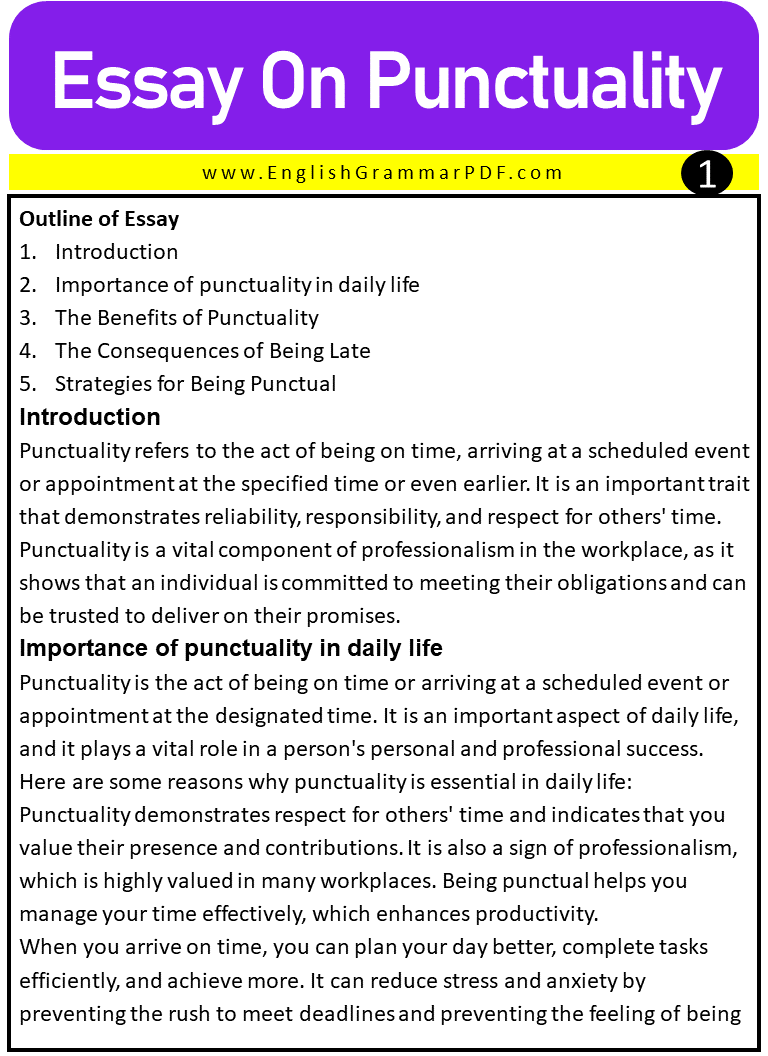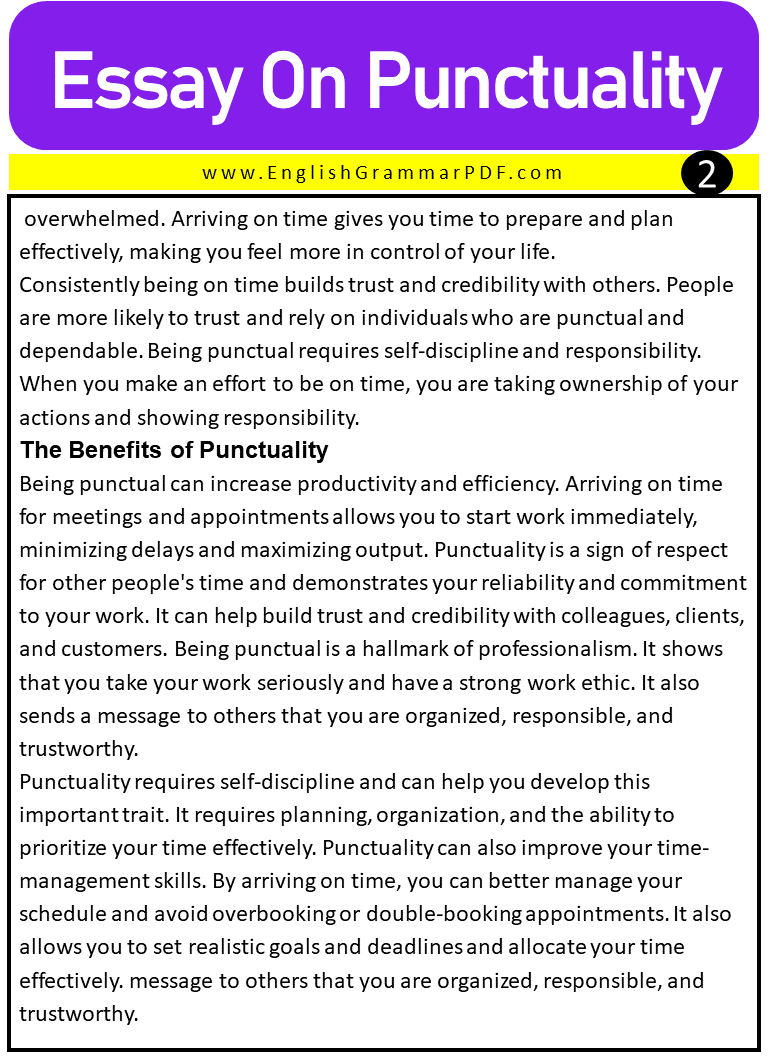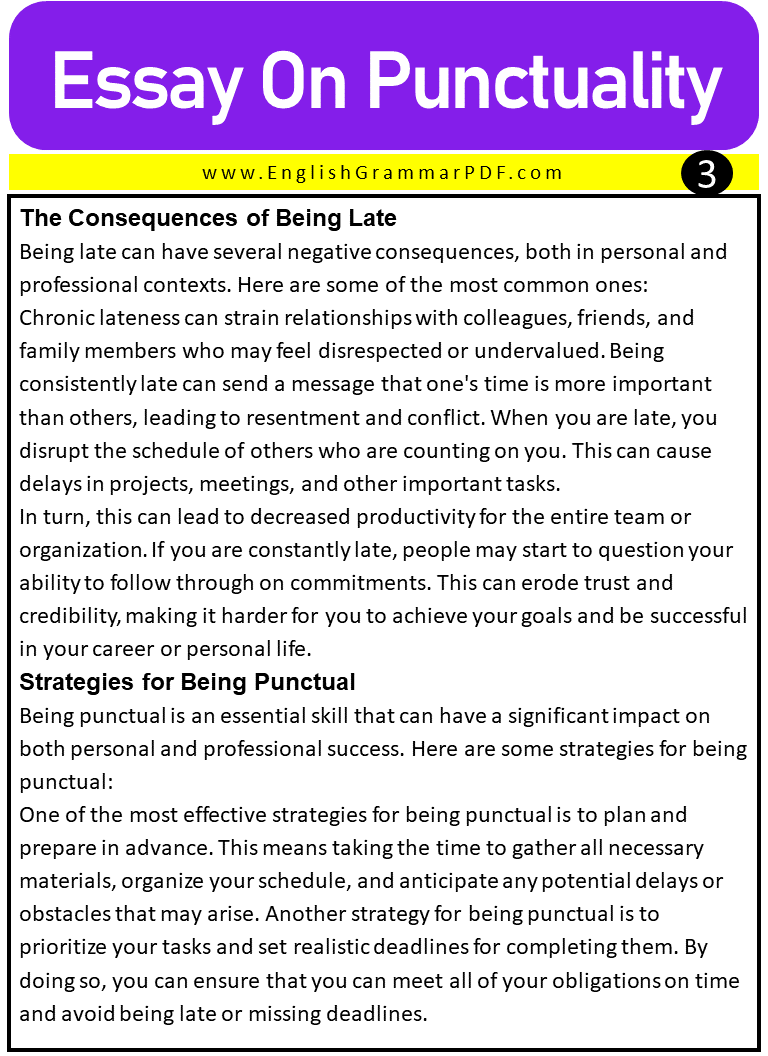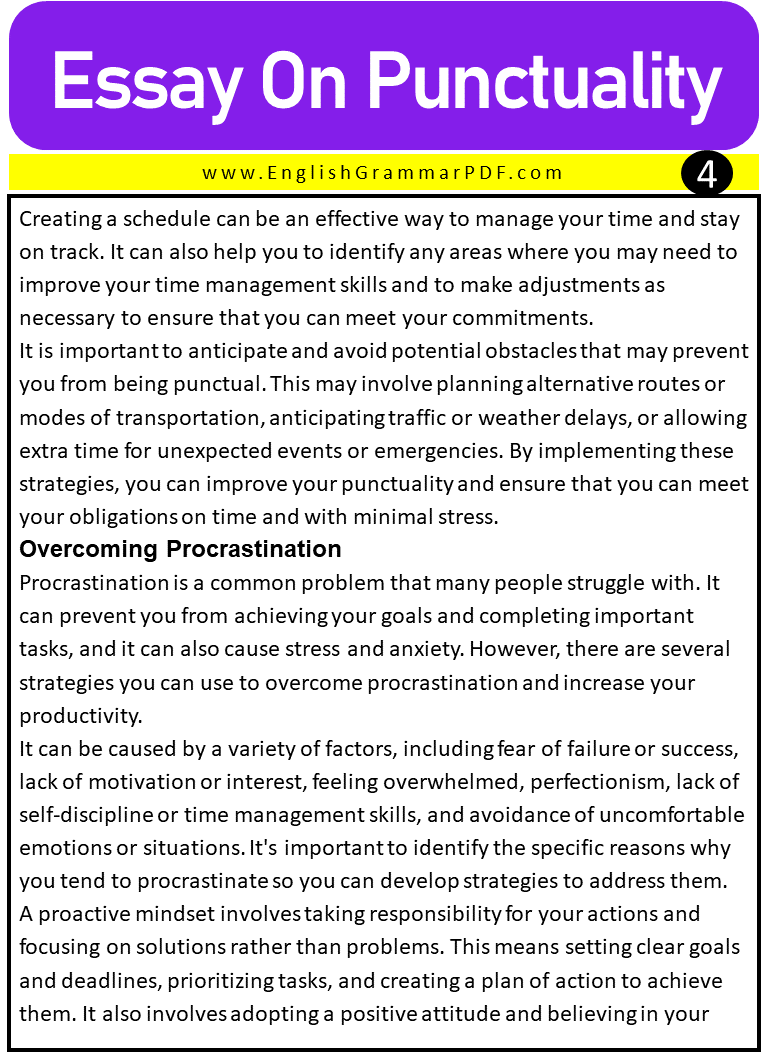Essay On Punctuality
Outline of Essay
- Introduction
- Importance of punctuality in daily life
- The Benefits of Punctuality
- The Consequences of Being Late
- Strategies for Being Punctual
Introduction
Punctuality refers to the act of being on time, arriving at a scheduled event or appointment at the specified time or even earlier. It is an important trait that demonstrates reliability, responsibility, and respect for others’ time. Punctuality is a vital component of professionalism in the workplace, as it shows that an individual is committed to meeting their obligations and can be trusted to deliver on their promises.
Importance of punctuality in daily life
Punctuality is the act of being on time or arriving at a scheduled event or appointment at the designated time. It is an important aspect of daily life, and it plays a vital role in a person’s personal and professional success. Here are some reasons why punctuality is essential in daily life:
Punctuality demonstrates respect for others’ time and indicates that you value their presence and contributions. It is also a sign of professionalism, which is highly valued in many workplaces. Being punctual helps you manage your time effectively, which enhances productivity.
When you arrive on time, you can plan your day better, complete tasks efficiently, and achieve more. It can reduce stress and anxiety by preventing the rush to meet deadlines and preventing the feeling of being overwhelmed. Arriving on time gives you time to prepare and plan effectively, making you feel more in control of your life.
Consistently being on time builds trust and credibility with others. People are more likely to trust and rely on individuals who are punctual and dependable. Being punctual requires self-discipline and responsibility. When you make an effort to be on time, you are taking ownership of your actions and showing responsibility.
The Benefits of Punctuality
Being punctual can increase productivity and efficiency. Arriving on time for meetings and appointments allows you to start work immediately, minimizing delays and maximizing output. Punctuality is a sign of respect for other people’s time and demonstrates your reliability and commitment to your work. It can help build trust and credibility with colleagues, clients, and customers. Being punctual is a hallmark of professionalism. It shows that you take your work seriously and have a strong work ethic. It also sends a message to others that you are organized, responsible, and trustworthy.
Punctuality requires self-discipline and can help you develop this important trait. It requires planning, organization, and the ability to prioritize your time effectively. Punctuality can also improve your time-management skills. By arriving on time, you can better manage your schedule and avoid overbooking or double-booking appointments. It also allows you to set realistic goals and deadlines and allocate your time effectively. message to others that you are organized, responsible, and trustworthy.
The Consequences of Being Late
Being late can have several negative consequences, both in personal and professional contexts. Here are some of the most common ones:
Chronic lateness can strain relationships with colleagues, friends, and family members who may feel disrespected or undervalued. Being consistently late can send a message that one’s time is more important than others, leading to resentment and conflict. When you are late, you disrupt the schedule of others who are counting on you. This can cause delays in projects, meetings, and other important tasks.
In turn, this can lead to decreased productivity for the entire team or organization. If you are constantly late, people may start to question your ability to follow through on commitments. This can erode trust and credibility, making it harder for you to achieve your goals and be successful in your career or personal life.
Strategies for Being Punctual
Being punctual is an essential skill that can have a significant impact on both personal and professional success. Here are some strategies for being punctual:
One of the most effective strategies for being punctual is to plan and prepare in advance. This means taking the time to gather all necessary materials, organize your schedule, and anticipate any potential delays or obstacles that may arise. Another strategy for being punctual is to prioritize your tasks and set realistic deadlines for completing them. By doing so, you can ensure that you can meet all of your obligations on time and avoid being late or missing deadlines.
Creating a schedule can be an effective way to manage your time and stay on track. It can also help you to identify any areas where you may need to improve your time management skills and to make adjustments as necessary to ensure that you can meet your commitments.
It is important to anticipate and avoid potential obstacles that may prevent you from being punctual. This may involve planning alternative routes or modes of transportation, anticipating traffic or weather delays, or allowing extra time for unexpected events or emergencies. By implementing these strategies, you can improve your punctuality and ensure you can meet your obligations on time and with minimal stress.
Overcoming Procrastination
Procrastination is a common problem that many people struggle with. It can prevent you from achieving your goals and completing important tasks, and it can also cause stress and anxiety. However, there are several strategies you can use to overcome procrastination and increase your productivity.
It can be caused by various factors, including fear of failure or success, lack of motivation or interest, feeling overwhelmed, perfectionism, lack of self-discipline or time management skills, and avoidance of uncomfortable emotions or situations. It’s important to identify the specific reasons why you tend to procrastinate so you can develop strategies to address them.
A proactive mindset involves taking responsibility for your actions and focusing on solutions rather than problems. This means setting clear goals and deadlines, prioritizing tasks, and creating a plan of action to achieve them. It also involves adopting a positive attitude and believing in your ability to succeed.
Breaking down larger tasks into smaller, more manageable steps can help reduce feelings of overwhelm and increase motivation. This also allows you to track your progress and celebrate small accomplishments along the way. It’s important to set realistic and achievable goals for each step to avoid feeling discouraged or overwhelmed.
Having someone to hold you accountable can be a powerful motivator to overcome procrastination. This can be a friend, family member, professional coach, or mentor. Additionally, seeking support from others who have experience with similar challenges can provide encouragement and helpful strategies for success.
FAQ’s
Is punctuality a matter of skill?
Punctuality and good time management are skills demanded by employers across all industries. That’s because being late can negatively affect whole teams, disrupting meetings and giving yourself and others a reputation for being unprofessional.
Can punctuality be a strength?
It pays to make punctuality your strength because employers are always looking for someone, they can count on to show up on time. Being punctual can help you get promoted in your current position, or can help you get hired for a full-time position if you are currently doing temp work.
Download Free Pdf Essay On Punctuality






More Essays:


